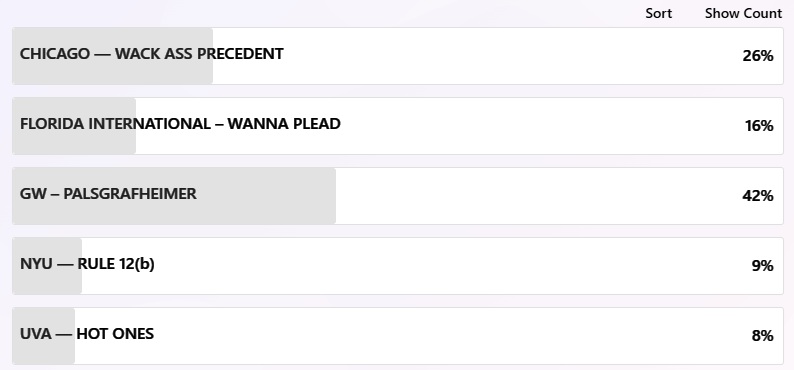
via
CLOC)
I
attended
a
fascinating
presentation
at
this
year’s CLOC
Global
Institute which
focused
on the
results
from
the most
recent CLOC
in-house
survey,
which
for
the
first
time
was
conducted
in
collaboration
with Harbor,
a
provider
of
legal
services
supporting
law
firms
and
corporate
legal
departments.
The
findings
from
the
survey
were
published
in
the 2025
CLOC
State
of
the
Industry
Report,
which
was
released
in
February
2025. The survey,
now
in
its
21st
year,
serves
as
an important
benchmarking
resource
for
legal
departments
worldwide, and
provides insights
into
legal
spending,
staffing,
operations,
and
technology
trends.
The
survey
itself
offers
important
insights,
but
the
panel
discussion
stood
out
for
what
they
chose
to
highlight
in
just
45
minutes and
how
they
interpreted
the
data
made
it
a
fun (think
Steve
Harvey
meets
State
of
the
Industry) and
engaging
conversation
with
the
audience.
The
panel
itself
was
a
diverse group consisting of Kevin Clem,
Chief
Growth
Officer,
Harbor Legal; Lauren Chung, Practice
Group
Leader,
Harbor
Legal; Farrah
Pepper, Chief Legal Innovation
Officer, Marsh
McLennan; and Oyango Snell,
Executive Director, CLOC.
Key
Insight:
Demand
for
Legal
Services
Will
Rise
First
the
survey
itself:
65%
of
the participants were
with Fortune
500 companies,
188 companies that
participated were
primarily
billion-dollar-plus organizations, and the
Survey
looked
at some
400
different
metrics.
What
the
panel
decided
to
focus
on
was
important.
The
number
one
highlight
from
the
Survey
which illuminates
and
informs
the
other
metrics:
83%
of
those
surveyed
expect
increased
demand
for
legal
services.
I
have discussed the
possible reasons for
this before, but
it
is
still
pretty
amazing
given the
proliferation
of
AI
tools
that
can
do
many
of
the
tasks
that
legal professional have
in
the
past
done. In addition, 77%
of
legal
departments
expect
to
prioritize
or
increase
legal
ops
headcounts.
Responses
To
Increased
Demand
for
Legal
Services
In
any
event,
given
this,
the
first
question and
brought up
by
the panel
was what are
the
options available to
handle
this
expected
increase.
Here
is
what
the
Survey
said
were
the
top
five
results:
• Increasing
workload
of
existing
internal
resources
(39%)
• Increasing
use
of
current
technology
(36%)
• Reengineering
work
processes
(36%)
• Automating
routine
tasks
(34%)
• Increasing
use
of
outside
counsel
(33%)
The
results
are
a
bit surprising and,
on
its
face, should strike
fear
in
the
hearts
of legal
professionals in
house
legal departments
since
it
seems
to
suggest
a
never-ending
“do
more
with
less” mentality.
But Pepper made
an
interesting
comment.
The
findings
don’t
necessarily
mean
that
as
much
as
suggesting
that
there
are
tools
like
automation,
AI,
and
GenAI
that
will
enable
in
house legal departments to
in
fact
do
more high-value
work. Chung added
that
new
ways
of
working
may
enable
more
to
be accomplished
Top
Use
Cases
Legal
Ops
Can
Address
The
next
question
selected
by
the
panel
to discuss
was the
areas
that
legal
ops
professional
can
best
address
and
improve.
Here
are
the
top
five
findings:
• Outside
counsel
management
(95%)
• Technology
strategy
(91%)
• Technology
administration
(88%)
• Program/project
management
(84%)
• Financial
management
(80%)
Okay,
but
here’s
an
interesting
point
that
the
panel
brought
up.
The
2024 findings were roughly the
same
as before, but
a couple
of
additional
areas
gained
significant
ground. Citation of
business
intelligence as
something
legal
ops
could
contribute
increased from
58%
to
65%,
which
suggest
that participants are
continuing
to search for
ways
to
get
more
and different value
out
of
data
and
are
using
AI
tools
to
get
there.
A second noteworthy finding: knowledge
management
went
from
71%
to
&79%,
suggesting
AI
tools
and
data
may
enable
legal
ops professionals to
play
a
greater
role
here, potentially
reducing
reliance
on
traditional
law
librarian
roles.
Most
Widely
Implemented
Technologies
Next
question:
What
are
the
most widely implemented technologies
by
legal
ops professionals?
• E-billing
(84%)
• Matter
management
(72%)
• Document
management
(72%)
• Legal
hold
(71%)
• Contract
management
(62%)
Like most
of
the
audience,
I
was surprised at
where
contract management ranked
since
that
seems
to
be
such
a
hot
topic. Perhaps some
early
adopters
are
heading
back
to
the
market,
looking
for
CLM
tools
that
better
meet
today’s
needs.
Planned
Technology
Implementations
But
let’s
look
at
the
results
of
the
next
survey
question:
What
technologies
are
participants
planning
to
implement
in
the
next
year.
• AI
(54%)
• Legal
service
request/intake
(33%)
• Workflow
automation
(33%)
• Contract
lifecycle
(30%)
• Document
management
(14%)
Lots
to
unpack
here.
AI
did
not crack the
top
5
for
tools
already in
use but
54% say
they
will implement it
in the
next
year. Frankly,
that
sounds
like
a
low
number given all
the
discussion
and
promise
of
AI.
But Clem suggested
that
lots
of
departments
are waiting to
see
what
the
tools
they
already
have
can
do
with
the
addition of
AI
functions
and
to
see
what
the overall business
AI
goals
and
implementation
plan are.
He believes
there
will
be
lots
of
movement
here
in
the next year. Pepper noted that
AI
tools
will
be
integrated more
and
more
in
tools
already
being
used
to
make
them
better
and enhancing
their functionality.
As
she put it,
in
house
legal
“will
not
be
asking
for
AI
tools
but
expecting
it
to
be integrated in
other
products.”
Top
Outside
Counsel
Management
Initiatives
The
panel
then
turned
to
a
review
of
the responses to
the question what the
top
outside
counsel
management
initiatives that in
house
legal
has implemented.
The
top
five
results:
• More
consistent
use
of
matter
planning
and
budgeting
(50%)
• Structured
review
of
annual
rate
increases
(48%)
• Use
of
alternative
fee
arrangements
(47%)
• Tougher
enforcement
of
outside
counsel
guidelines
(45%)
• Keeping
more
work
in-house
(41%)
Again, the
panelists
had
lots
of insights on these numbers.
Chung
suggested
that
the
findings
indicate
that
in-house
legal
is
demanding more
visibility
and transparency in
their relationships with
outside
counsel.
For example,
a key
theme
is
more
structure
and governances to
things
like
rate
increase
requests. Pepper added
that
use
of
the
team
guidelines
should
be
changed
to policy, procedures, or processes to reflect that
need
for alignment of
business
interests with
outside
counsel.
Finally, Clem
brought
up
an
interesting
point:
rates
may
continue
to
go
up
but
not
as a
matter of
rote.
Rather
rates
will
increase
based
on value that
a lawyer can provide.
More
routine
work
will
be
done
by
AI
tools
and
thus
the
time
spent
doing
work
that
AI can’t do
will
be
more valuable.
To obtain
a
rate
increase,
value
most
be
documented.
By
way
of example,
Clem
informally surveyed
the audience:
the
highest
hourly
rate requested the
past
year
was
$2,850
an hour
which
represented
a
30%
increase over
the
past
year.
The
Final
Word
The
panelists were
asked
for
a
final
word
on
what
the
take
aways
from
the survey.
Here
is
what
they
shared:
Chung: Lean
into
data
—
benchmark
and
build
from
there.
Pepper: Go
deeper
into
context
before
drawing
conclusions.
Clem: Visualize
and
present
data
clearly
to
support
decisions
and
engagement.
All
three panelists
didn’t
focus
on
specific
tools
or
use
cases
in
their
final
remarks.
Instead,
they
all
emphasized
process
—
how
legal
departments
use
data,
visualize
it,
and
engage
with
it
to
drive
real
transformation.
Stephen
Embry
is
a
lawyer,
speaker,
blogger
and
writer.
He
publishes TechLaw
Crossroads,
a
blog
devoted
to
the
examination
of
the
tension
between
technology,
the
law,
and
the
practice
of
law.












 Kathryn
Kathryn






